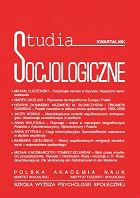"Społeczeństwo w społeczeństwie". Socjologiczna koncepcja konstytucjonalizmu po komunizmie
Society in a Society. A Sociological Concept of Constitutionalism
after Communism
Author(s): Grażyna SkąpskaSubject(s): Social Sciences
Published by: Instytut Filozofii i Socjologii Polskiej Akademii Nauk
Keywords: constitutionalism; autoreflection; semantic steering; consolidation; hypocritical constitutionalism; negative constitutional consensus; positive constitutional consensus; rupture; differentiation; legal revolutions; rule of law; eclectic const
Summary/Abstract: Do postcommunist constitutions reflect a theory of society, which would contribute to the consolidation of new democracies around symbols and meanings, and to the formation of a positive constitutional consensus? Do they allow for choosing from many options of further development? The former system had such a theory at its disposal – it was Stalinist constitutionalism, founded on the Marxist theory of social development and a clearly defined distinction between Stalinist and liberal democratic constitutionalism. The social correlate of Stalinist constitutionalism, known also as hypocritical, presented a negative constitutional consensus. Current difficulties in the democratic consolidation, and the formation of a positive constitutional consensus are a result of a particular character of the legitimization of the transformation, in the concept of a legal revolution, and of the lacking of an undisputable and clear conceptualization of human rights. The latter present a deciding factor in the postcommunist differentiation from the Stalinist constitutionalism. In consequence, a hypothetic possibility of an eclectic constitutionalism emerges which success depends on its reflection of local democratic tradition and social aspirations.
Journal: Studia Socjologiczne
- Issue Year: 179/2005
- Issue No: 4
- Page Range: 39-67
- Page Count: 28
- Language: Polish

